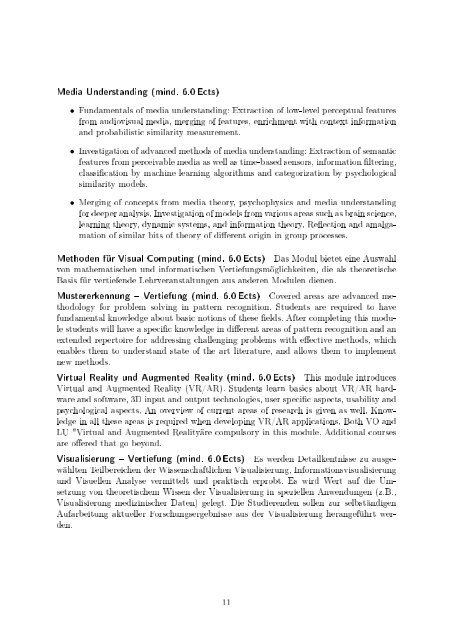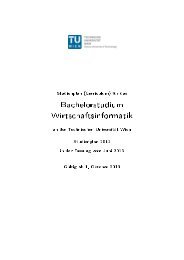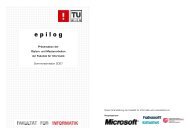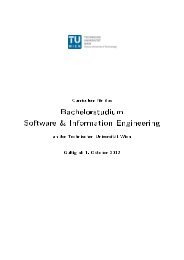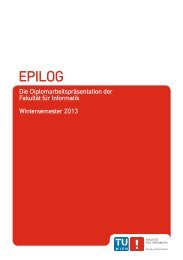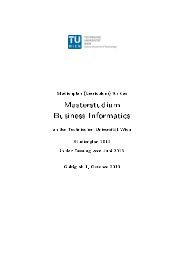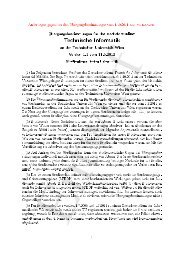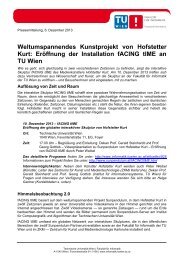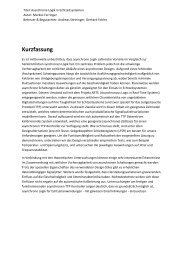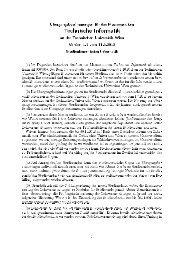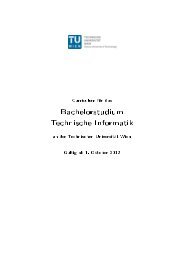Masterstudium Visual Computing - Fakultät für Informatik, TU Wien
Masterstudium Visual Computing - Fakultät für Informatik, TU Wien
Masterstudium Visual Computing - Fakultät für Informatik, TU Wien
Sie wollen auch ein ePaper? Erhöhen Sie die Reichweite Ihrer Titel.
YUMPU macht aus Druck-PDFs automatisch weboptimierte ePaper, die Google liebt.
Media Understanding (mind. 6.0 Ects)<br />
• Fundamentals of media understanding: Extraction of low-level perceptual features<br />
from audiovisual media, merging of features, enrichment with context information<br />
and probabilistic similarity measurement.<br />
• Investigation of advanced methods of media understanding: Extraction of semantic<br />
features from perceivable media as well as time-based sensors, information ltering,<br />
classication by machine learning algorithms and categorization by psychological<br />
similarity models.<br />
• Merging of concepts from media theory, psychophysics and media understanding<br />
for deeper analysis. Investigation of models from various areas such as brain science,<br />
learning theory, dynamic systems, and information theory. Reection and amalgamation<br />
of similar bits of theory of dierent origin in group processes.<br />
Methoden <strong>für</strong> <strong>Visual</strong> <strong>Computing</strong> (mind. 6.0 Ects) Das Modul bietet eine Auswahl<br />
von mathematischen und informatischen Vertiefungsmöglichkeiten, die als theoretische<br />
Basis <strong>für</strong> vertiefende Lehrveranstaltungen aus anderen Modulen dienen.<br />
Mustererkennung Vertiefung (mind. 6.0 Ects) Covered areas are advanced methodology<br />
for problem solving in pattern recognition. Students are required to have<br />
fundamental knowledge about basic notions of these elds. After completing this module<br />
students will have a specic knowledge in dierent areas of pattern recognition and an<br />
extended repertoire for addressing challenging problems with eective methods, which<br />
enables them to understand state of the art literature, and allows them to implement<br />
new methods.<br />
Virtual Reality und Augmented Reality (mind. 6.0 Ects) This module introduces<br />
Virtual and Augmented Reality (VR/AR). Students learn basics about VR/AR hardware<br />
and software, 3D input and output technologies, user specic aspects, usability and<br />
psychological aspects. An overview of current areas of research is given as well. Knowledge<br />
in all these areas is required when developing VR/AR applications. Both VO and<br />
LU "Virtual and Augmented Realityäre compulsory in this module. Additional courses<br />
are oered that go beyond.<br />
<strong>Visual</strong>isierung Vertiefung (mind. 6.0 Ects) Es werden Detailkentnisse zu ausgewählten<br />
Teilbereichen der Wissenschaftlichen <strong>Visual</strong>isierung, Informationsvisualisierung<br />
und Visuellen Analyse vermittelt und praktisch erprobt. Es wird Wert auf die Umsetzung<br />
von theoretischem Wissen der <strong>Visual</strong>isierung in speziellen Anwendungen (z.B.,<br />
<strong>Visual</strong>isierung medizinischer Daten) gelegt. Die Studierenden sollen zur selbständigen<br />
Aufarbeitung aktueller Forschungsergebnisse aus der <strong>Visual</strong>isierung herangeführt werden.<br />
11


